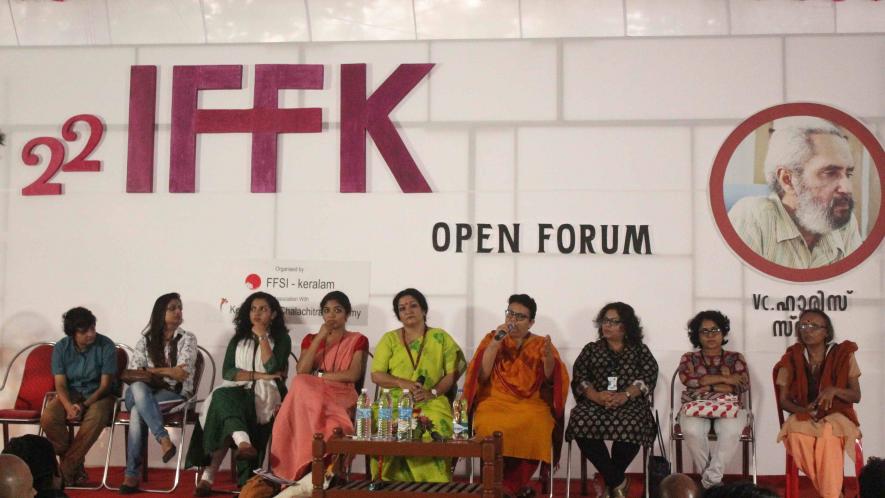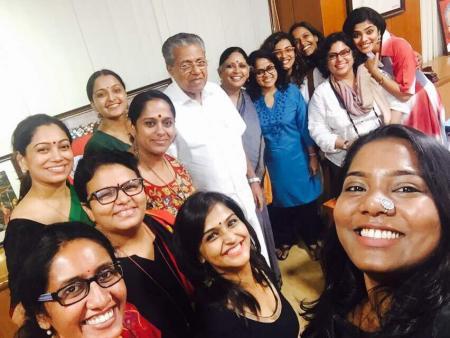Women in Cinema Collective Rattles Entrenched Patriarchal Interests in Malayalam Film Industry

WCC Members at the IFFK 2017 Open Forum
The Women in Cinema Collective (WCC), formed in May 2017, made its mark at the just-concluded 22nd International Film Festival of Kerala, and the tremors it sent have begun to rattle entrenched patriarchal interests.
The WCC had a stall on its own at IFFK’s main venue, and one of the “Open Forum” discussions held at the festival was on WCC and the issues concerning women in the film industry. The campaign run by the WCC in support of the actress who was sexually assaulted had its impact on the festival schedule itself, with a selection of films being screened as part of the section “Avalkkoppam (with her): male auteurs and Malayalam women’s cinema of the twentieth century”.
As in the case of ossified power structures everywhere, the patriarchal interests in Malayalam cinema too have unleashed attacks against those who challenge them. The latest such instance is the shower of abuses on actor Parvathy, who said at the IFFK Open Forum that the film Kasaba starring superstar Mammootty had dialogues that are derogatory to women. Parvathy subsequently put up a post reiterating that her response was about the content of the film, and not against, in her own words, “one of India’s finest actors”. But that hasn’t satisfied the hordes of social media users – self-proclaimed Mammootty “fans” – who have written thousands of abusive comments targeting Parvathy.
Attacks and abuses have followed the WCC right from its birth. Although there were discussions about the need for such a collective were there even before, ultimately the formation of the organisation was triggered by the horrific assault, allegedly by a driver, against a prominent actress. Popular actor Dileep, who was accused of having orchestrated the crime to settle personal scores, was arrested and jailed for 85 days before being released on bail.
Even as many in the social media and elsewhere sought to blame the assault survivor, several leading film personalities came out publicly in support of Dileep. The WCC took shape in this context, with its strong support to the actress who spoke out courageously about her ordeal.
Following its formation on 18 May, WCC representatives visited Kerala Chief Minister Pinarayi Vijayan, requesting the support of the government in the efforts to ensure gender justice in the film industry. The CM, in turn, assured them that a committee would be formed to study the issues faced by women in the industry. Subsequently, the government constituted a committee headed by retired High Court judge K Hema for the purpose.

The demands submitted by WCC to the government include the formation of anti-sexual harassment cells in film production sets, higher representation of women in film sets, equal pay for equal work, and a safe working environment for women in film production. The collective got registered as a society on 1 November.
At the IFFK Open Forum which attracted huge attention, women artists, filmmakers, technicians and academics talked about a range of issues.
“Cinema is not just an artistic endeavour, but also a political endeavour,” said actor Parvathy. “Cinema should reflect the points of view of men, women, transgenders.”
“The film societies which opened up world cinema to so many people in Kerala were male-dominated. Very few women could come to film societies to watch films,” said award-winning director Vidhu Vincent. “While the men who went to the screenings of the film societies got introduced to the visual language of cinema, the women were bringing up the kids which the men left at home.”
Vidhu Vincent points out that issues regarding spaces and opportunities for women in cinema are inextricably linked to the question of funding. Who funds movies, and who spends money to watch the movies? Who are the ones with the economic independence and power to make decisions regarding these?
“Cinema is a capital-intensive industry. Hence it becomes critical to see who owns capital, and how it is used in cinema to buttress patriarchy,” Vincent said. “To put it differently, the change we envisage cannot be confined to cinema alone. Change has to occur at the level of society as a whole.”
Many of the immediate concerns of the collective are related to the security of women in cinema – at the workplaces and elsewhere. The February 2017 assault case was a turning point in this regard. The change in the direction of the case investigation coincided with the WCC’s meeting with the Chief Minister. The conspiracy angle had not come to light until then. “The interventions of the WCC in this regard won us legitimacy in the eyes of a lot of people. The government also handled the issue vigilantly,” Vidhu Vincent told Newsclick.
“So many women face abuse in the film industry. There has to be an effective Internal Complaints Committee mechanism as per law to redress such issues. Women in cinema raising such issues has been very revealing for the common public. It was an occasion when the public heard about the harsh conditions faced by those whom they had seen only on the silver screen so far. The celebrities were standing before them, de-glamourised and with feet on the ground.”
WCC is a pioneering initiative, the first of its kind in the history of Indian cinema, and its tremors have been felt far beyond the state. Sources say that UN agencies have also expressed interest in the work of the WCC, and that of the committee set up by the Kerala government.
There are many challenges facing those who have chosen to speak up, precisely because those who control capital wield the weapons with which to hit back at dissenting voices.
“The women who have taken strong positions on various issues – such as the issue of disciplinary action by AMMA against the accused in the assault case – have done so risking their jobs. Such people have found it difficult to get roles in Malayalam films, for instance,” Vincent said.
Members are aware of the organisational challenges which the WCC has to confront. They note that the members of the collective – ranging from producers, directors and actors to makeup women and light technicians – have different class positions. Resolving the contradictions that would arise as a result of this would require digging deep into the reservoirs of creating thinking on the part of the organisation, along with concomitant changes in society.
The accused in the assault case is somebody who held a powerful – almost monopolistic – position in the businesses of production, distribution and exhibition of Malayalam cinema. The developments following the case, however, have also led to the power equations within the Malayalam film industry undergoing a churning.
The structure of the Malayalam film industry – as is the case with the film industries elsewhere in India – is very opaque. WCC has demanded that the Kerala Cinemas (Regulation) Act, 1958 should be scrapped and replaced with a suitable law which will bring more transparency in film industry.
As debates in the public sphere heat up, the work of the collective continues. The combined impact of these on Malayalam cinema might be a lasting one.
Get the latest reports & analysis with people's perspective on Protests, movements & deep analytical videos, discussions of the current affairs in your Telegram app. Subscribe to NewsClick's Telegram channel & get Real-Time updates on stories, as they get published on our website.























